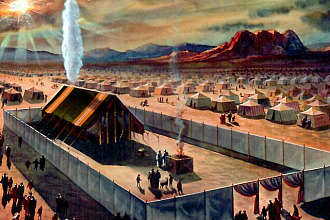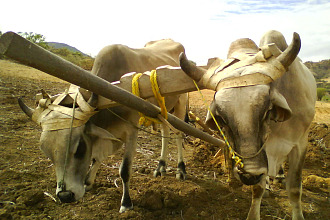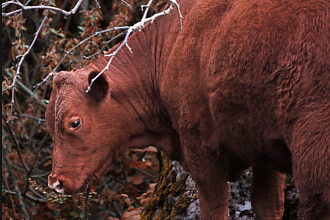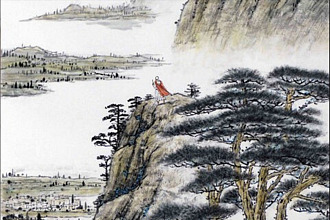Parasha for the Week: Terumah: Exodus 25:1 – 27:19
Haftarah for the Week: 1 Kings 5:26 – 6:13
Besorat Yeshua: Mark 15:1 - 15
Overview
G-d commands Moshe to build a Mishkan (Sanctuary) and gave him with detailed instructions. The Children of Israel are asked to contribute precious metals and stones, fabrics, skins, oil and spices for the building of the sanctuary.
"Description of the Mishkan"
1. In the Mishkan's outer courtyard are an altar for the burnt offerings and a laver for washing.
2. The Tent of Meeting is divided by a curtain into two chambers.
- The outer chamber is accessible only to the kohanim (priests), the descendants of Aharon. This contains the table of showbreads, the menorah, and the golden altar for incense.
- The innermost chamber, the Holy of Holies, may be entered only by the kohen gadol
(high priest), and only once a year, on Yom Kippur. This is the Ark that held the Ten Commandments inscribed on the two tablets of stone that G-d gave on Mount Sinai.
"Ark Cover with Pure Gold"
The Torah states, "Cover (the ark) with a layer of pure gold on the inside and outside." (Ex. 24:11) Why was it necessary to cover the ark with gold on the inside? The Talmud (Tractate Yoma 72b) comments that from here we see symbolized that a Torah scholar must be pure inside as well as outside to be considered a Talmid Chacham, a scholar. Jeremiah said, "This is the covenant I will make with the house of Israel after that time," declares the LORD. "I will put my law in their minds and write it on their hearts. I will be their God, and they will be my people (Jeremiah 31:33). According to Jeremiah the ark symbolizes our heart in which God writes his law, the Torah. Just as the ark had gold on both the inside and the outside, so too a Torah student and scholar is not someone who just speaks wisdom to be heard, he must also internalize this wisdom and live by it. Rabbi Packouz said: Whenever you speak about lofty thoughts, ask yourself whether you actually follow the principles you speak about. If not, do not stop speaking about those ideals, while you elevate your behavior.
"Toward the Cover Shall be the Face of the Cherubs "
The Ark contained the Ten Commandments, the olive branch that budded, and a jar of manna. The cover of the Ark was made out of pure gold and had two Cherubs hammered out of the same piece of gold. The Torah states that: "The Cherubs shall be with wings spread upward, sheltering the Cover with their wings with their faces toward one another; toward the Cover shall be the faces of the Cherubs." (Exodus 25:20) Rabbi Seforno said, the upward spread wings teach us that the goal of life is to ascend in our spiritual and intellectual quest to understand God's plan and how He interacts with us. The faces of the Cherubs inclined downward toward the Ark which held the Torah to teach us that the means to understand God is through understanding His Word. The Cherubs faced each other to teach that we must interact with each other to share and clarify the wisdom of God's Word. Also, we must be responsible to treat each other with respect and responsibility -- to think not only of oneself, but also for others.
"With HaShem's Help"
A man asked Rabbi Assad for advice. "There is an old, run-down store in the downtown area of the city. I can get it a very reasonable price. I think that with my marketing skills I may be able to turn that location into a profitable venture. Do you think I should buy it?" Rav Assad said. "I don't think that it would be prudent to enter that part of the city for a business venture." The man left somewhat dejected. A few days later another man asked the Rabbi the identical question about the same property. "There is an old, run-down store in the downtown area of the city. I can get it a very reasonable price. I think that with my marketing skills, and of course with Hashem's help, I may be able to turn that location into a profitable venture. Do you think I should buy it?" This time Rabbi Assad nodded in approval. "I think you should make a go of it. I have no doubts that it will be a success." When word got out that the Rabbi was behind this endeavor, the first man stormed into his study upset. "Why did the you tell me not to buy the property and then tell my friend the opposite?" "My dear student," answered the Rabbi, "there is a great difference. Your friend took in a partner. He said that with the help of Hashem he could make a go of it. When someone includes Hashem in his plans, I am sure that he will succeed!"
"Wise Use of our Resources"
Just like the Kohen who lit the candle in the Holy Temple each day, we, too, must kindle G-d's candle within us with the light of his Word thereby illuminating ourselves, our surroundings and the world. Our rabbis gave the following parable to illustrate the importance of this message: A businessman turned to a wealthy and charitable person for a loan of 1000 rubles promising to pay back the entire sum in one year. Although 1000 rubles was a large amount, the wealthy man approved the loan. True to his word, the businessman returned the 1000 rubles exactly a year later. The wealthy man noticed that the bills were the very same ones he lent! They were even in the same order and wrapped with the same string! The wealthy man became very upset. "Why are you upset?" asked the borrower. "Didn't I give you back the entire amount exactly to the day?" "Yes, you did. But you didn't make use of it, you just let it sit there. I could have used this money for my own business. I could have helped many people improve their businesses with this money. Keeping such a large amount in your drawer doing nothing was a real waste!" The same is with our life and talents. If we don't use them they are lost. God gave us time, money, talents, everything belongs to him and they will grow only if we use them for the progress of his cause and for the benefice of the community and the society.
HAFTARAH: 1 Kings 5:26 – 6:13
Haftarah: The Sanctuary was used by Israel for almost five hundred years before Solomon built the Temple in Jerusalem: "In the four hundred and eightieth year after the Israelites had come out of Egypt, in the fourth year of Solomon's reign over Is¬rael, in the month of Ziv, the second month, he began to build the temple of the LORD. " (1 Kings 6:1).
G-d was blessed Solomon. "The word of the LORD came to Solomon: "As for this tem-ple you are building, if you follow my decrees, carry out my regulations and keep all my commands and obey them, I will fulfill through you the promise I gave to David your father. And I will live among the Israelites and will not abandon my people Israel." (1 Kings 6:11-13).
"The spot on which the temple was built had long been regarded as a consecrated place. It was here that Abraham, the father of the faithful, had revealed his willingness to sacrifice his only son in obedience to the command of the L-rd. Here G-d had renewed with Abraham the covenant of blessing, which in¬cluded the glorious Messianic promise to the human race of deliverance through the sacrifice of the Son of the Most High. "I swear by myself, declares the LORD, that because you have done this and have not withheld your son, your only son, I will surely bless you and make your descendants as numerous as the stars in the sky and as the sand on the seashore. Your descendants will take possession of the cities of their enemies, and through your offspring all nations on earth will be blessed, because you have obeyed me." (Genesis 22:16-18). Here it was that when David of¬fered burnt offerings and peace offerings to stay the avenging sword of the destroying angel, God had an¬swered him by fire from heaven. See 1 Chronicles 21. And now once more the worshipers of Jehovah were here to meet their God and renew their vows of allegiance to Him." (Patriarch and Kings p.37)
Besorat Yeshua Mark 15:1 - 15
Haggai, one of the prophets who preached to rebuild the Temple after the destruction of Solomon's temple by Babylon, said that the glory of the second temple will be greater than the first one. "'The glory of this present house will be greater than the glory of the former house,' says the LORD Almighty." (Haggai 2:9a) The second Temple had the privilege of hosting the Messiah, who came to save his people 'And in this place I will grant peace,' declares the LORD Almighty." (Haggai 2:9b) Peace will be granted in this second temple, not only through the coming of the Messiah but his sacrifice for us, "the punishment that brought us peace was upon him, and by his wounds we are healed." (Isaiah 53:5).
Parasha: God prepares the way of the Messiah by giving all instructions about the building of the sanctuary,
Haftara: God continues to show the way in allowing Solomon to build the Temple.
Besorah: Yeshua the Mashiach is in Jerusalem, he came to save his people, to get upon his shoulders the punishment that Israel deserves. According to Isaiah. his sufferings brought us peace. Yeshua revealed that he was the Messiah-King of Israel "Are you the king of the Jews?" asked Pilate. "Yes, it is as you say," Y'shua replied." (Mark 15:2).














